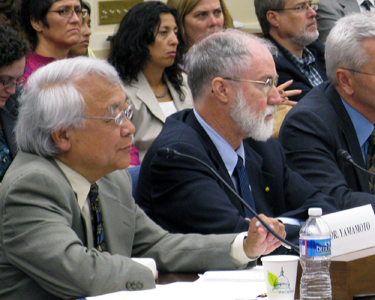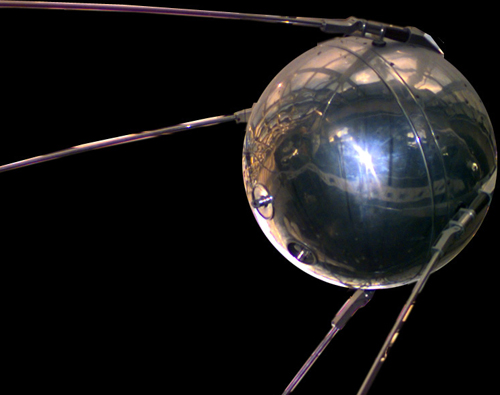
By Sarah Paris
“Science policy” is not a term likely to trend on Twitter anytime soon, not even among scientists. Neither the concept, nor the field itself, occupies much attention in the busy minds of most researchers, physicians, and educators. Yet, their work in healthcare and academia is profoundly impacted by local, state, or national policies.
Policy, in a nutshell, determines "how things get done, who does them, who benefits, and, importantly—who pays," according to vice chancellor for Science Policy Strategy, Keith Yamamoto, PhD, who also direct precision medicine at UCSF. Large-scale scientific innovations, including precision medicine, are built on a foundation of structural policies.
As a research-focused academic health center, UCSF has a vital stake in shaping science policy at every level, including in Washington. This is why UCSF faculty leaders and staff professionals have continuously taken their expertise to key committees, testimonies, and national discussions on the future of research in America.
UCSF was the first UC campus to have a representative in Washington, DC, dedicated to engaging with federal agencies and national legislation. “It was clear from our experience that being onsite is essential to influence policy,” said Yamamoto.
UCSF INFLUENCERS
Natalie Alpert, executive director, Federal Government Relations, serves as UCSF’s primary liaison to Congress, the Administration and federal agencies. “In practice, this means I spend a lot of time working to increase investment in biomedical research, promoting UCSF’s contributions to health care and innovation, and serving as a resource to both policymakers in DC and to students and faculty on campus,” Alpert said.
Sharing an office and expertise with colleagues from UCOP and other UC campuses, she also talks to counterparts at universities across the country to coordinate efforts and connect to lawmakers across the political spectrum. Alpert guides and prepares UCSF leadership, faculty, and students who go to DC to share their expertise and recommendations with policy makers.

Read his testimony on the impact of precision medicine on preventing and curing disease or watch the video (starting at 00:37:10)
In his role as vice chancellor for Science Policy Strategy, Keith Yamamoto used to spend a great deal of his time in DC before the COVID-19 pandemic rerouted meetings to virtual platforms. Over his many years as a Washington insider, he has forged relationships with numerous allies and decisionmakers. He works closely with Alpert to meet with key members of both parties. He and other UCSF leaders also frequently testify before congressional committees, brief members of Congress and their staff, and discuss policy with Administration officials.
“Keith is a strategic thinker who knows better than anyone what to say and what policy to advance. He has a deep understanding of what motivates elected officials to get things done, and he has a very good instinct for how to weigh in and push policy forward,” Alpert says.
BUILDING BRIDGES, CREATING FOUNDATIONS
Yamamoto sees his mission as building bridges and breaking down silos in Congress, where different committees control different areas of science funding and compete for scarce research dollars. He and other top scientists across the country are helping to shape the conversation through foundational reports that lay out broad visions for the future of science. One such report, steered by Yamamoto, then chair of the Board on Life Sciences for the National Academy of Sciences, formed the foundation of today’s precision medicine.
Currently, two equally broad visions have been or are being developed:
- The Coalition for Life Sciences (CLS) prepared a new version of “A Vision and Pathway for NIH,” originally created in 2016. Chaired by Yamamoto, CLS is an alliance of professional organizations working together to foster public policies that advance basic biological research and its applications in medicine and other fields.
- Research!America is an influential alliance of academic and healthcare organizations that advocates for science, discovery, and innovation. Yamamoto serves as a member of the board, along with other longtime colleagues prominent on the national science front. Research!America is preparing “Science Reset,” a set of recommendations advocating for a greatly increased national investment in science.
Watch a video of Yamamoto’s recent presentation, starting at 00:12:45

“The nation is faced with another ‘Sputnik’ moment*,” Yamamoto asserts. “For the U.S. to maintain primacy in STEM and to address the critical challenges we are facing, we need to bring back Federal R&D as share of the GDP back to where it was in the Sixties.”
*Sputnik 1, the first Earth-orbiting satellite, was launched by the Soviet Union in 1957. As a consequence, the US government greatly increased their investment in science to catch up on what was perceived as lost ground.
STUDENTS ADVOCATING FOR SCIENCE
Not surprisingly, given the impact on their future, advocacy has been a focus for many students at UCSF. They formed the Science Policy Group to build capacity for science communication as well as a platform for initiating advocacy. Advised and supported by faculty experts, including Yamamoto, and by UCSF Advocacy manager Allie Jones, students have developed workshops and scheduled speakers to help scientists of all levels hone their policy-writing and advocacy skills. They have used these skills to educate members of Congress and the Administration on issues important to them, including support for science education and research funding.

Matthew Ryan, an MD/PhD student at UCSF, was part of such a delegation last year. At the time, he documented the trip as an “eye-opening experience” in a photographic Twitter feed. One year later, he reflects on how the trip strengthened his burgeoning interest in science policy and advocacy. Among the moments that stood out for him was meeting with Victor Dzau, MD, President of the National Academy of Medicine (formerly the Institute of Medicine) who encouraged the students to get involved in science policy early. This resonated with Ryan, who sees himself as a representative of a younger generation that is not content with the status quo. “Advocacy is the cornerstone of 21st century medicine,” Ryan said. “We can’t just be working on an individual level; we have to address issues on a structural level to promote health equity.”
SCIENCE POLICY RESEARCH
This structural work is supported by foundational research in health policy, notably, by the UCSF Philip R. Lee Institute for Health Policy Studies (IHPS), which has long addressed complex and challenging systemic issues by translating research across disciplines and fields to inform health policy. IHPS experts, among them Andrew Bindman, MD, Claire Brindis, DrPH, Laura Schmidt, PhD, MPH, and Tracey Woodruff, PhD, MPH, have been prominent in influencing policy at the local, state, and national level. IHPS is also at the forefront of understanding how genetic technologies and precision medicine will change the clinical practice of the future.
UCSF ADVOCACY
UCSF Community & Government Relations launched UCSF Advocates in 2017 to galvanize and coordinate advocacy opportunities across the university. From campaigning for BCH Oakland patient Isabel Bueso, who faced deportation, to calling on Congress to put in place permanent protections for DACA recipients, UCSF Advocates have stood up for values and policies fundamental to UCSF’s mission.
While the COVID-19 pandemic has put a halt to travel to Washington, DC, virtual meetings continue to provide opportunities for dialogue and engagement. Any member of the UCSF community can contribute their voice and become an advocate for health, science, and equity-promoting policies.
You Can Make a Difference:
- Share your story or your expertise with policy makers
- Become a UCSF Advocate
- Join the UCSF Science Policy Group
- Learn more about UCSF Government Relations
- Download the "Twitter for Academics" Guide
Related Content:
- Taking Science to Sacramento: UCSF Advances Health Policy in California
- Partnering with City & Community to Deliver Precision Science, Care, and Education
